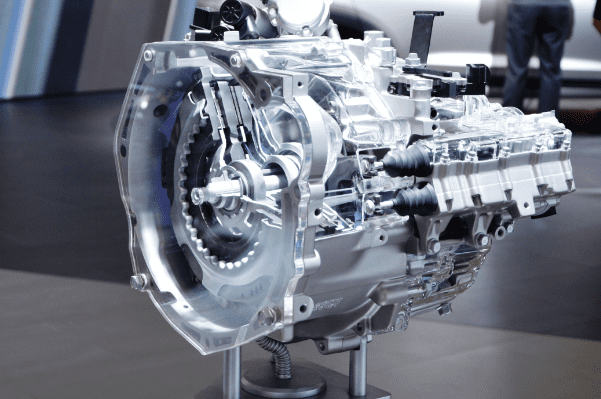2010 Hyundai Tucson Transmission Problems | Recalls | Reliability
Last Updated on November 6, 2023 by Robert Wilson
The 2010 Hyundai Tucson is a compact SUV known for its good fuel efficiency, reliable performance, and comfortable interior. All trim levels of the 2010 Tucson get 26 MPG, with 23 MPG in the city and 31 MPG on the highway.
It offered two engine options, decent cargo space, and a range of features depending on the trim level.
Safety features included antilock brakes, stability control and airbags.
It was well-received for its ride and handling, making it a practical choice for daily driving.
2010 Hyundai Tucson Transmission Problems
The 2010 Hyundai Tucson has experienced various transmission issues, including rough shifting, slipping gears, and even complete transmission failure. There have been 65 complaints and 4 recalls by NHTSA so far.
2010 Hyundai Tucson Pros & Cons
Pros
- Good engine power with excellent fuel economy
- High-quality interior with lots of features
- Outstanding safety score
Cons
- Some subpar interior materials
- Less cargo space than other compact SUVs
2010 Hyundai Tucson Issues & Complaints



NHTSA ID Number: 11488991
Date: October 12, 2022
Components: ENGINE
Incident Date: August 6, 2022
Consumer Location: STOCKTON, CA
Summary of Complaint:
The owner of a 2010 Hyundai Tucson reported an issue with their vehicle. The vehicle had previously undergone repairs as per Hyundai Technical Service Bulletin Number: 21-01-023H-3, which involved an Engine Monitoring Logic Update. The vehicle stalled while it was at a complete stop. Notably, no warning lights were illuminated before this occurred.
In response to the stalling incident, the owner had the vehicle moved to the side of the road and subsequently towed to a dealer for inspection. The dealer’s diagnosis revealed that the Engine Monitoring Logic had failed, and an unknown repair was deemed necessary. The dealer forwarded a diagnostic report to the manufacturer.
The manufacturer, upon review of the diagnostic report, decided to cover half of the repair cost. The complaint indicates that the vehicle did not crash, catch fire, and there were no reported injuries or fatalities associated with this incident.
NHTSA ID Number: 11258935
Date: September 30, 2019
Components: STRUCTURE, LATCHES/LOCKS/LINKAGES
Incident Date: September 29, 2019
Consumer Location: FARMINGTON, PA
Vehicle Identification Number: KM8JUCAC8AU****
Summary of Complaint:
The owner of a 2010 Hyundai Tucson lodged a complaint concerning issues with the vehicle’s locking system. Specifically, the rear hatch and the front passenger door were not responding to remote commands for opening. The contact suspected that the problem might be related to the actuator.
On September 29, 2019, the malfunction occurred three times. Of note, while the vehicle was traveling at a speed of 70 mph, the front passenger door unexpectedly opened. The contact did not report the problem to the dealer or the manufacturer, and as a result, the vehicle was neither diagnosed nor repaired.
The failure was identified when the vehicle had covered 213,000 miles. There were no reports of crashes, fires, injuries, or fatalities associated with this incident.
NHTSA ID Number: 10328775
Date: May 4, 2010
Components: SEAT BELTS
Incident Date: April 10, 2010
Consumer Location: MANHATTAN, KS
Vehicle Identification Number: KM8JU3AC2AU****
Summary of Complaint:
The consumer had recently purchased a new Hyundai Tucson and noticed a specific concern related to the vehicle’s seat belt system. The complaint indicated that there was no alert bell, buzzer, or warning light designed to inform the front seat passenger that they had not fastened their seat belt.
It’s important to note that this issue was not associated with a crash, fire, injuries, or fatalities. The complaint was primarily focused on the absence of a seat belt alert system for the front seat passenger, which the consumer found to be lacking in their newly acquired vehicle.
NHTSA ID Number: 10664051
Date: December 13, 2014
Components: SUSPENSION, ENGINE
Incident Date: October 10, 2014
Consumer Location: CHICAGO, IL
Vehicle Identification Number: KM8JU3AC7AU****
Summary of Complaint:
The consumer purchased the vehicle on October 3, 2014. Two weeks later, the check engine light came on. They visited the Hyundai dealer three times within a month for the same issue, which was seemingly resolved each time.
However, on December 11, 2014, over two months later, the check engine light reappeared. The consumer was returning the vehicle to the dealer for another check on the check engine light and an examination of the front suspension. They expressed concerns about the vehicle’s stability and safety during winter months, emphasizing the need for safe driving conditions.
No crashes, fires, injuries, or fatalities were reported, but the consumer sought to address the recurring check engine light issue and safety concerns.
2010 Hyundai Tucson Recalls
NHTSA Campaign Number: 23V651000
Date: September 22, 2023
Issue: ABS Unit May Cause Engine Compartment Fire, posing a risk of injury.
Manufacturer: Hyundai Motor America
Components: SERVICE BRAKES, HYDRAULIC
Number of Affected Units: 1,642,551
Summary:
Hyundai Motor America is recalling several vehicle models due to a potential safety hazard related to the Anti-Lock Brake System (ABS) module. The ABS module may develop a brake fluid leak internally, leading to an electrical short circuit. This electrical issue can result in an engine compartment fire, whether the vehicle is parked or in motion.
The affected vehicles include:
| Year | Model |
|---|---|
| 2011-2015 | Elantra, Genesis Coupe, Sonata Hybrid |
| 2012-2015 | Accent, Azera, Veloster |
| 2013-2015 | Elantra Coupe, Santa Fe |
| 2014-2015 | Equus |
| 2010-2012 | Veracruz |
| 2010-2013 | Tucson |
| 2015 | Tucson Fuel Cell |
| 2013 | Santa Fe Sport |
Remedy:
Owners of the 2010 Tucson vehicles are advised to park them outside and away from structures until the necessary recall repair is completed. Hyundai will provide the repair free of charge, involving the replacement of the ABS fuse.
NHTSA Campaign Number: 13V113000
Date: April 1, 2013
Issue: Stop Lamp Switch may Function Intermittently, posing risks of brake light failure, cruise control issues, and unintentional vehicle movement.
Manufacturer: Hyundai Motor Company
Components: EXTERIOR LIGHTING
Number of Affected Units: 1,712,336
Summary:
Hyundai Motor Company is issuing a recall for a potential safety concern related to the stop lamp switch. The issue involves the stop lamp switch functioning intermittently, which could lead to several safety risks:
- Failure to Illuminate Stop Lamps: The intermittent operation of the stop lamp switch may result in the brake lights not illuminating when the brakes are applied. This can reduce the visibility of the vehicle to other drivers and increase the risk of a rear-end collision.
- Inability to Disengage Cruise Control: The faulty switch may also cause difficulties in disengaging the cruise control when needed, which can be a safety hazard in various driving situations.
- Transmission Shifter Issue: In addition, when the ignition is in the ‘ON’ position, the transmission shifter might be movable out of the Park position without requiring the application of the brake. This could lead to unintended vehicle movement, increasing the risk of an accident.
Remedy:
Hyundai will address the issue by replacing the problematic stop lamp switch, aiming to eliminate these safety concerns.
NHTSA Campaign Number: 11V259000
Date: April 26, 2011
Issue: Rear Reflex Reflectors May Not Comply with Safety Standards, leading to reduced rear visibility and an increased risk of a crash.
Manufacturer: HYUNDAI MOTOR COMPANY
Components: EXTERIOR LIGHTING
Number of Affected Units: 7,829
Summary:
Hyundai Motor Company is conducting a recall for certain 2010 Tucson vehicles, specifically those manufactured between February 27, 2010, and April 17, 2010. The reason for the recall is the failure to comply with Federal Motor Vehicle Safety Standard No. 108, which covers “Lamps, Reflective Devices, and Associated Equipment.” The non-compliance pertains to the photometry requirements of the rear reflector assemblies located in the rear bumpers of these vehicles.
Issue:
The issue stems from the rear reflector assemblies not meeting the required photometry standards, which could lead to reduced visibility of the rear of the vehicle. This reduced visibility increases the risk of a collision, as other drivers may have difficulty seeing the affected vehicle, particularly in low-light conditions.
Remedy:
Hyundai will address the non-compliance issue by taking corrective actions to ensure that the rear reflector assemblies meet the necessary safety standards and provide adequate rear visibility.
NHTSA Campaign Number: 10V061000
Date: February 25, 2010
Issue: Passive Occupant Detection System Module Program Problem, potentially causing the passenger airbag to deploy even if a child is seated, increasing the risk of injury.
Manufacturer: Hyundai Motor Company
Components: AIR BAGS
Number of Affected Units: 515
Summary:
Hyundai is conducting a recall for specific model year 2010 Tucson vehicles due to a concern related to the Passive Occupant Detection System (PODS) module program. The issue specifically affects adult right front seat passengers who weigh over approximately 240 pounds.
Issue:
The problem arises when properly seated adult right front seat passengers, particularly those weighing over 240 pounds, cause the PODS module program to illuminate the “AIR BAG” warning lamp. This lamp illumination can potentially lead to a significant safety concern.
If the “AIR BAG” warning lamp is lit, the passenger airbag may deploy in the event of a crash that requires front airbag deployment. This would happen even if a child is seated in the right front seating position, which is not supposed to occur. Such an occurrence increases the risk of injury to a child front passenger.
Remedy:
To address this issue, Hyundai will take corrective actions to resolve the problem with the PODS module program, ensuring that the airbag system functions as intended, enhancing passenger safety.
Owner Notification:
Owners of the affected 2010 Tucson vehicles will receive notifications from Hyundai regarding this recall. It is crucial for owners to act upon these notifications promptly to mitigate the risk of improper airbag deployment and potential harm to child passengers.
The 2010 Hyundai Tucson is generally considered reliable. Hyundai has improved its product quality over the years.
Reliability depends on maintenance and individual experiences. Regular servicing is essential.
Hyundai’s warranty offers peace of mind. Check owner reviews for insights. Well-maintained Tucson often provide reliable transportation.
I have had 2010 Hyundai Tucson vehicle for 9 months now. What I appreciate: the remarkably tight turning radius, the vehicle’s appealing appearance both inside and out, and the inclusion of various extras at a reasonable price, like heated leather seats and Bluetooth connectivity. What I’m not too fond of: the ride is quite rough, noticeably more so than my Nissan Maxima or even my older car.
Michael, MI, USA
I Bought 2010 Tucson 6 months ago, and it’s now at 5000 miles, a mix of highway and city driving. The engine and transmission combo make it feel like a 6-cylinder, which adds to the driving enjoyment. I’m getting a decent 20 mpg in the city and 27 mpg on the highway, which is an improvement from my ’04 Trailblazer. The only drawback is the highway road noise on concrete; I had to add a 4″ foam pad under the spare tire to help with that.
Anderson, TX, USA
Also Read

